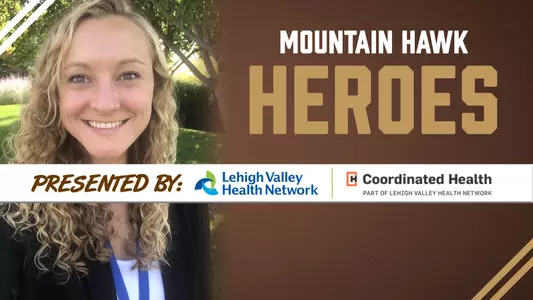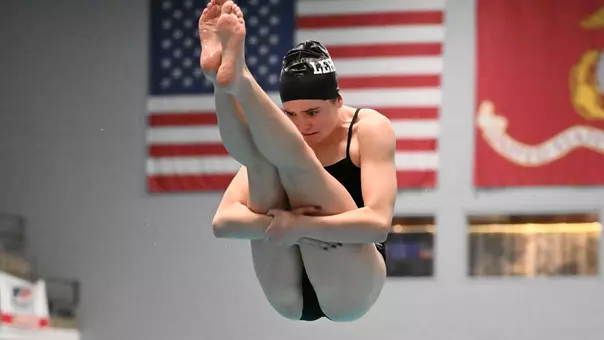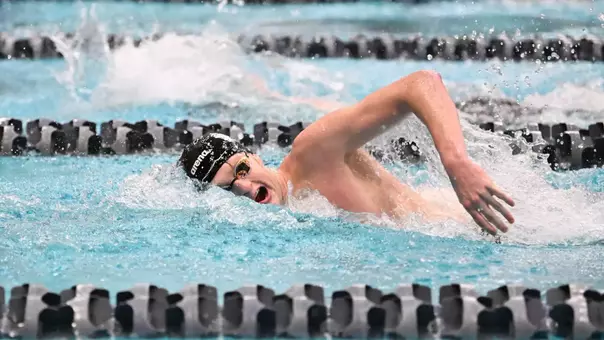Lehigh University Athletics

Mountain Hawk Heroes: Swimming and Diving Alum Taylor Wise
9/30/2020 12:50:00 PM | Women's Swimming and Diving, Support, Features, Flight 45, Intellectual Development
Every Wednesday, Lehigh Athletics, Lehigh Valley Health Network and Coordinated Health is proud to recognize a Mountain Hawk Hero - someone associated with Lehigh Athletics who is making a difference in the medical field. We continue today with swimming and diving alum Taylor Wise '15.
Previous Mountain Hawk Heroes
September 23: Matt Christman (Track and Field Alum)
September 16: Steph Fratoni (Field Hockey Alum)
September 9: Mike Price (Swimming and Diving Alum)
September 2: Yasmin Deliz (Track and Field Alum)
August 26: Evan Guerrero (Men's Lacrosse Alum)
August 19: Ross Biggs (Baseball Alum)
August 12: Cynthia Izuno Macri (Soccer Alum)
August 5: Susan Westman (Rowing Student-Athlete)
July 29: Megan Hetzel (Track and Field/Cross Country Alum)
July 22: Lexi Martins (Women's Basketball Alum)
July 15: Nii Daako-Darko (Track and Field/Cross Country Alum)
July 8: Ali Linsk Butash (Softball Alum)
July 1: Kimberly Scotto-Wetzel & Jonathan Wetzel (Track and Field/Cross Country Alums)
June 24: Robert Bonow (Men's Basketball Alum)
June 17: Morgan Decker (Softball Alum)
June 10: Jim Guzzo (Former Quarterback)
June 3: Amina Affini (Women's Basketball Alum)
May 27: Natalie Krane (Women's Soccer Alum)
May 20: Tricia Klein (Women's Golf Assistant Coach)
By: Justin Lafleur, Lehigh Sports Communications
Today, Taylor Wise is making her mark as a clinical psychology intern at the Cheyenne Wyoming VA Medical Center, working with the veteran population in primary care.
The former Lehigh swimmer's interest in psychology was largely influenced by her athletic career.
"It's easy to focus on just the physical components of athletic performance and forget about the mental or behavioral side of things," said Wise. "Talking about that has such a huge potential to change not only an athlete's performance, but also overall experience training, being part of a team and pursuing a goal.
"How to cope with the mental side of sport is important," she continued. "Once I realized that, it grew my interests in pursuing psychology as a career."
With the COVID-19 pandemic so greatly impacting everyday life, mental health has taken center stage.
"If someone already had underlying mental health symptoms, those might be even more complicated by what's going on with COVID," said Wise. "Lately, there has been a lot of helping people process all the changes that have gone on over the past few months."
Because of the frequent changes and unpredictability of the pandemic, Wise has been seeing a lot more issues adjusting to a changing world.
"The world has changed drastically, jobs have changed and relationships have changed," she said. "People have unfortunately been lost and illnesses are a much higher concern. All these things are brought into our appointments, along with what people are already seeing us for."
Wise is currently pursuing her doctorate of psychology degree at the University of Denver, and has a few more months of her internship (which is set to finish in July, 2021). As part of her role, which is full-time, she works with other professionals in a "whole-health approach."
"The most common conditions psychologists and psychiatrists treat are depression, anxiety or adjustment-related conditions such as major life changes where people are struggling and need some extra support," said Wise.

Psychology isn't one-size-fits-all. The "treatment" is truly dependent on each person's case.
"We do a lot of screeners, such as patient health questionnaires and generalized anxiety disorder screeners," said Wise. "They track symptoms, then based on what comes up, the severity and type of symptoms will inform our treatment. Typical treatments in primary care are approaches like cognitive behavioral therapy, which are evidence-based, brief treatments appropriate for primary care as opposed to an ongoing analytical approach (which is what most people traditionally think of when they think psychotherapy).
"Cognitive behavioral therapy is much more solution-focused," she continued. "We pick an episode of care… one area to focus on."
Take sleep for example.
"There are a number of different interventions that are patient dependent," said Wise. "With sleep hygiene, we often create a plan of how to make sleep quality better for that individual patient, including sleep schedule and how to cope with anxieties that come up at night. Insomnia is a common condition we look at."
For most patients, it starts with screening, then as Wise said, they "go from there."
"Treatment can be a lot of coping mechanisms, a lot of relaxation strategies and a lot of problem solving, but we have the clinical training to be able to treat the deeper needs when they come up," said Wise.
For a while, Wise thought she'd take a typical medical school path, but then she shifted course.
"I was originally on the premed track at Lehigh, but it felt like I was forcing it," she said. "It just never really felt completely right. So at pretty much the last moment possible my senior year, I withdrew medical school applications and pursued sport psychology."
Wise pursued a master of science in kinesiology and sport psychology at Temple University.
"I loved it and it gave me so many new perspectives on the athletic experience – things like coping, resiliency and identity," she said. "It really gave me a whole different view to the athletic world and one's athletic identity. But I wanted more of the clinical training, not just sport performance (although I believe that's very important)."

The desire for clinical training led Wise to the University of Denver.
"At Denver, I've found a whole other list of interests," she said. "I've still been able to maintain that sport psychology focus, but also incorporate health psychology, military psychology and psychological assessment, which is basically a bunch of testing to diagnose and inform treatment."
For her internship, Wise opted for the VA route in a medical setting because it combined numerous interests, and she sees a lot of similarities in the military population as the athletic population.
"There is resiliency, commitment to a common goal, certainly teamwork, identity, having a really deep sense of purpose and an indomitable will to pursue that purpose," said Wise. "That's what I've connected from my athletic experience to now in working with military populations. And I've always had the health focus, wanting to treat people holistically.
"Being in the military medical setting is how I've wrapped it all together."
Wise's experiences are more connected than you'd think. Wise's time on teams all her life – including Lehigh's swimming and diving team – is only helping her work on an interdisciplinary care team as a clinical psychologist.
"The route I've taken is health psychology, which usually involves working with professionals of other disciplines like physicians, physical therapists, nutritionists, nurses and social workers," said Wise.
"We each have our area of discipline we focus on, but we're frequently communicating and throughout COVID, continue to do so on a virtual basis," she continued. "It's actually been going very well. Patients are able to be seen from all areas of their health. They can have access to specialists and the specialists communicate to one another to make sure care is coordinated and makes sense for the patient's individual needs."
Communication and teamwork was demanded of Wise in her time as a Mountain Hawk as well.
"Swimming is more of an individual sport than others, but you're still constantly training with team members and working with a wide range of people," she said. "That has helped communication in the professional world and knowing how to work towards a common goal. Today, I have my area of expertise, like my individual event, but I am still reliant on and working with a number of other people as part of a bigger system for a common, bigger goal. Clinical psychology primary care is ultimately to create a healthier patient population."
That bigger goal is truly what it's all about, and why Wise got into the field in the first place.
"The core reason I got into psychology was because I thought there's an unmet need, at least in my experience, to address the mental health side of performance," she said. "If someone's struggling with anxiety, disordered eating, substance use or trauma, that's going to show up in your performance.
"I enjoy being able to validate people's experiences, help them cope with it and really transform their health and performance," Wise continued. "That's what I hoped to do in athletic populations, and I have found that to be very similar in military and veteran populations."
There's a singular moment that makes what Wise does worth it.

"You can see a sense of relief wash over patients when they realize, whatever mental or behavior issue they might be struggling with, is a normal process," she said. "It's just not usually talked about in a physically-oriented world."
After her internship ends, Wise hopes to continue working with the veteran population, with hopes of working in sports psychology at some point and in some capacity as well.
For Wise, it's safe to say the sky is the limit, and it all started with her time at Lehigh.
"Lehigh honestly was a very challenging place to be, but ultimately in a really positive way, and I think that's true for a lot of people," she said. "It's given me a lot of growth experiences in a place with a strong support system.
"Lehigh helped me define who I am while also navigating high expectations, learning about what's available in the future and learning how to overcome the challenges that come up along the way," Wise continued. "All of that has been vital as I've continued on in my career. Lehigh provided training and resiliency, how to work with people of a lot of different backgrounds.
"Lehigh set the stage for me thinking about the identity I want to take on moving forward."
Wise's identity is a difference-maker in an increasingly important, but often underrepresented, area… mental health.
Previous Mountain Hawk Heroes
September 23: Matt Christman (Track and Field Alum)
September 16: Steph Fratoni (Field Hockey Alum)
September 9: Mike Price (Swimming and Diving Alum)
September 2: Yasmin Deliz (Track and Field Alum)
August 26: Evan Guerrero (Men's Lacrosse Alum)
August 19: Ross Biggs (Baseball Alum)
August 12: Cynthia Izuno Macri (Soccer Alum)
August 5: Susan Westman (Rowing Student-Athlete)
July 29: Megan Hetzel (Track and Field/Cross Country Alum)
July 22: Lexi Martins (Women's Basketball Alum)
July 15: Nii Daako-Darko (Track and Field/Cross Country Alum)
July 8: Ali Linsk Butash (Softball Alum)
July 1: Kimberly Scotto-Wetzel & Jonathan Wetzel (Track and Field/Cross Country Alums)
June 24: Robert Bonow (Men's Basketball Alum)
June 17: Morgan Decker (Softball Alum)
June 10: Jim Guzzo (Former Quarterback)
June 3: Amina Affini (Women's Basketball Alum)
May 27: Natalie Krane (Women's Soccer Alum)
May 20: Tricia Klein (Women's Golf Assistant Coach)
By: Justin Lafleur, Lehigh Sports Communications
Today, Taylor Wise is making her mark as a clinical psychology intern at the Cheyenne Wyoming VA Medical Center, working with the veteran population in primary care.
The former Lehigh swimmer's interest in psychology was largely influenced by her athletic career.
"It's easy to focus on just the physical components of athletic performance and forget about the mental or behavioral side of things," said Wise. "Talking about that has such a huge potential to change not only an athlete's performance, but also overall experience training, being part of a team and pursuing a goal.
"How to cope with the mental side of sport is important," she continued. "Once I realized that, it grew my interests in pursuing psychology as a career."
With the COVID-19 pandemic so greatly impacting everyday life, mental health has taken center stage.
"If someone already had underlying mental health symptoms, those might be even more complicated by what's going on with COVID," said Wise. "Lately, there has been a lot of helping people process all the changes that have gone on over the past few months."
Because of the frequent changes and unpredictability of the pandemic, Wise has been seeing a lot more issues adjusting to a changing world.
"The world has changed drastically, jobs have changed and relationships have changed," she said. "People have unfortunately been lost and illnesses are a much higher concern. All these things are brought into our appointments, along with what people are already seeing us for."
Wise is currently pursuing her doctorate of psychology degree at the University of Denver, and has a few more months of her internship (which is set to finish in July, 2021). As part of her role, which is full-time, she works with other professionals in a "whole-health approach."
"The most common conditions psychologists and psychiatrists treat are depression, anxiety or adjustment-related conditions such as major life changes where people are struggling and need some extra support," said Wise.

Psychology isn't one-size-fits-all. The "treatment" is truly dependent on each person's case.
"We do a lot of screeners, such as patient health questionnaires and generalized anxiety disorder screeners," said Wise. "They track symptoms, then based on what comes up, the severity and type of symptoms will inform our treatment. Typical treatments in primary care are approaches like cognitive behavioral therapy, which are evidence-based, brief treatments appropriate for primary care as opposed to an ongoing analytical approach (which is what most people traditionally think of when they think psychotherapy).
"Cognitive behavioral therapy is much more solution-focused," she continued. "We pick an episode of care… one area to focus on."
Take sleep for example.
"There are a number of different interventions that are patient dependent," said Wise. "With sleep hygiene, we often create a plan of how to make sleep quality better for that individual patient, including sleep schedule and how to cope with anxieties that come up at night. Insomnia is a common condition we look at."
For most patients, it starts with screening, then as Wise said, they "go from there."
"Treatment can be a lot of coping mechanisms, a lot of relaxation strategies and a lot of problem solving, but we have the clinical training to be able to treat the deeper needs when they come up," said Wise.
For a while, Wise thought she'd take a typical medical school path, but then she shifted course.
"I was originally on the premed track at Lehigh, but it felt like I was forcing it," she said. "It just never really felt completely right. So at pretty much the last moment possible my senior year, I withdrew medical school applications and pursued sport psychology."
Wise pursued a master of science in kinesiology and sport psychology at Temple University.
"I loved it and it gave me so many new perspectives on the athletic experience – things like coping, resiliency and identity," she said. "It really gave me a whole different view to the athletic world and one's athletic identity. But I wanted more of the clinical training, not just sport performance (although I believe that's very important)."

The desire for clinical training led Wise to the University of Denver.
"At Denver, I've found a whole other list of interests," she said. "I've still been able to maintain that sport psychology focus, but also incorporate health psychology, military psychology and psychological assessment, which is basically a bunch of testing to diagnose and inform treatment."
For her internship, Wise opted for the VA route in a medical setting because it combined numerous interests, and she sees a lot of similarities in the military population as the athletic population.
"There is resiliency, commitment to a common goal, certainly teamwork, identity, having a really deep sense of purpose and an indomitable will to pursue that purpose," said Wise. "That's what I've connected from my athletic experience to now in working with military populations. And I've always had the health focus, wanting to treat people holistically.
"Being in the military medical setting is how I've wrapped it all together."
Wise's experiences are more connected than you'd think. Wise's time on teams all her life – including Lehigh's swimming and diving team – is only helping her work on an interdisciplinary care team as a clinical psychologist.
"The route I've taken is health psychology, which usually involves working with professionals of other disciplines like physicians, physical therapists, nutritionists, nurses and social workers," said Wise.
"We each have our area of discipline we focus on, but we're frequently communicating and throughout COVID, continue to do so on a virtual basis," she continued. "It's actually been going very well. Patients are able to be seen from all areas of their health. They can have access to specialists and the specialists communicate to one another to make sure care is coordinated and makes sense for the patient's individual needs."
Communication and teamwork was demanded of Wise in her time as a Mountain Hawk as well.
"Swimming is more of an individual sport than others, but you're still constantly training with team members and working with a wide range of people," she said. "That has helped communication in the professional world and knowing how to work towards a common goal. Today, I have my area of expertise, like my individual event, but I am still reliant on and working with a number of other people as part of a bigger system for a common, bigger goal. Clinical psychology primary care is ultimately to create a healthier patient population."
That bigger goal is truly what it's all about, and why Wise got into the field in the first place.
"The core reason I got into psychology was because I thought there's an unmet need, at least in my experience, to address the mental health side of performance," she said. "If someone's struggling with anxiety, disordered eating, substance use or trauma, that's going to show up in your performance.
"I enjoy being able to validate people's experiences, help them cope with it and really transform their health and performance," Wise continued. "That's what I hoped to do in athletic populations, and I have found that to be very similar in military and veteran populations."
There's a singular moment that makes what Wise does worth it.

"You can see a sense of relief wash over patients when they realize, whatever mental or behavior issue they might be struggling with, is a normal process," she said. "It's just not usually talked about in a physically-oriented world."
After her internship ends, Wise hopes to continue working with the veteran population, with hopes of working in sports psychology at some point and in some capacity as well.
For Wise, it's safe to say the sky is the limit, and it all started with her time at Lehigh.
"Lehigh honestly was a very challenging place to be, but ultimately in a really positive way, and I think that's true for a lot of people," she said. "It's given me a lot of growth experiences in a place with a strong support system.
"Lehigh helped me define who I am while also navigating high expectations, learning about what's available in the future and learning how to overcome the challenges that come up along the way," Wise continued. "All of that has been vital as I've continued on in my career. Lehigh provided training and resiliency, how to work with people of a lot of different backgrounds.
"Lehigh set the stage for me thinking about the identity I want to take on moving forward."
Wise's identity is a difference-maker in an increasingly important, but often underrepresented, area… mental health.
Women's Lacrosse vs. La Salle
Saturday, February 28
MHT EP10 - Women's Basketball
Friday, February 27
2026 Men's Golf Season Preview
Friday, February 20
MHT EP9 - Women's Wrestling
Thursday, February 19













